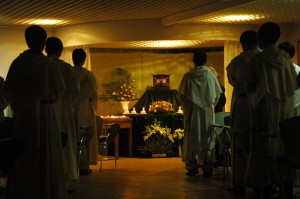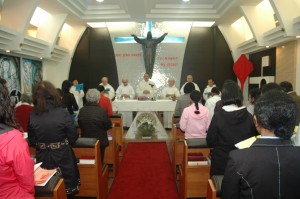The celebration of tonight’s liturgy marks the end of Lent and the beginning of the Easter Triduum. During the Easter Triduum or the holy three days, which is the longest Liturgy of the church year, we celebrate the greatest event ever taking place in the life of any believer, the event of our salvation. It begins tonight with the washing of the feet and the establishment of the Eucharist and priesthood, continues through tomorrow, where we all will accompany Jesus all the way to the cross and concludes with the Easter Vigil, when the glory of the risen Christ will be revealed to us.
Tonight celebration is not just a dramatization, or a historical look back at events in the life Christ. It is about bringing to life, making present the mysteries we celebrate: the celebration of Eucharist, the institution of the priesthood, and the mandatum or the new commandment.
If we thumb through the pages of the Holy Scripture we will see that for the Jewish people the Passover meal was one of the biggest feasts of the year. It was a time for the people of Israel to give thanks for their salvation. To remember the night they were saved from slavery. A time to remember how the Lord went through Egypt and passed over their houses, a time to recall how the God of their fathers opened the waters of the sea to bring them to the Promised Land.
This evening, we look back at how Jesus celebrated the Passover with his disciples, bringing the Passover Meal to its ultimate purpose and meaning. It was on that table where Jesus sat with his disciples that He began to reveal the real meaning of the Passover. He showed Himself as Son of God who would be sacrificed on the first Good Friday for our sins. On that night, on the upper room and in front of his disciples, He offered Himself; He gave His Body and Blood, in the great mystery of faith as our food for eternal life. It was on that gathering on the upper room that the meaning of this celebration changed from a recall gathering to a living gathering.
It is because of that change of essence in the meaning of the Passover meal that the Eucharist we celebrate, contrary to the Passover meal celebrated by the Jews is not just a recall of what happened in the past. We are not here just to remember, for if the love of God is not manifested through our life to the world by what we do here then it is not an authentic Eucharist. The food we receive here is not just for contemplation or adoration. It must be food for action; we have to become the new bread for the world.
It was also on that same room and at that same Supper that Jesus established, the Sacrament of Priesthood and commissioned the apostles, as the first priests of the New Covenant, with the command “Do this in memory of me.†When Saint Paul explains to Corinthians the institution of the Eucharist he says that this power is given to mere men, not because of any personal worth, but explicitly because Jesus Christ, who commanded, “Do this in memory of me†has chosen it to be so and he prayed to the Father for them “Consecrate them in the truth.†(John 17:17)
It was during this commission to service through the ministry of priesthood that Jesus washed the disciples’ feet. “Master, you will never wash my feet. Peter rebuked Jesus when He approached him and knelt in front of him. I guess Peter said this out of shock. The disciples were horrified. The washing of the feet was only done by the slaves and servants. It was a scandalous thing to do. Not only they did not understand what Jesus was doing, but they did not want to be part of it. “What I am doing, you do not understand now, but you will understand later.†Jesus answered and said to him and to the rest of the disciples. By his action Jesus symbolically overturned the whole social order. In that one significant act he showed his disciples and teaches each one of us that Christian’ greatness is not determined by position, or rights or education or title. Christian values are measured by a readiness to meet the need of the moment with an act of service and love.
 My dear brothers and sisters tonight we recall the occasion on which the institution of the Eucharist, the establishment of priesthood and the washing of the feet took place. But we are not here just to remember. The Eucharist is the culmination of Jesus’ love for us, and our celebration of the Eucharist should send you and me out from here to minister, to serve and to love the Lord in others. “I give you a new commandment: love one another. As I have loved you, so you also should love one another.†(John 13:34). This commandment is not just a remembrance of what Jesus said but, a legacy for all Christians to follow. On this Holy Thursday through these mystical actions and signs let us make a living presence the mysteries that we celebrate.
My dear brothers and sisters tonight we recall the occasion on which the institution of the Eucharist, the establishment of priesthood and the washing of the feet took place. But we are not here just to remember. The Eucharist is the culmination of Jesus’ love for us, and our celebration of the Eucharist should send you and me out from here to minister, to serve and to love the Lord in others. “I give you a new commandment: love one another. As I have loved you, so you also should love one another.†(John 13:34). This commandment is not just a remembrance of what Jesus said but, a legacy for all Christians to follow. On this Holy Thursday through these mystical actions and signs let us make a living presence the mysteries that we celebrate.
 I wish you the richest blessing of God in these Holy Days. May all of us be sustained by the Bread of eternal life as we look with hope to Easter!
Fr Alejandro Salcedo, O. P.
St. Dominic’s Priory, March 2013
